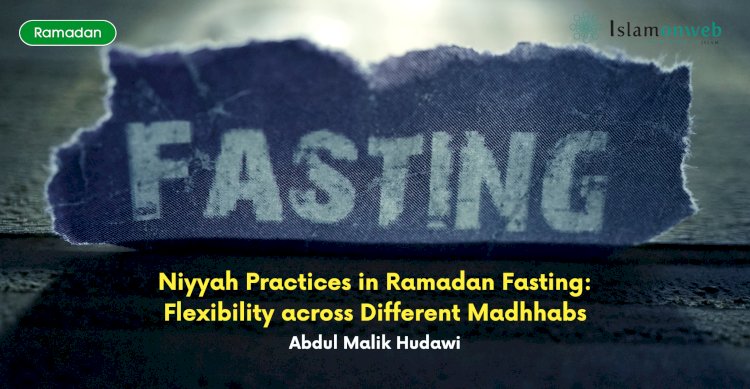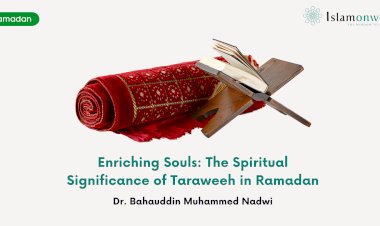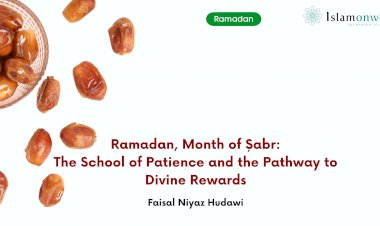Niyyah Practices in Ramadan Fasting: Flexibility across Different Madhhabs
Fasting stands as the paramount feature and central act of worship during Ramadan. Niyyah (intention) is an obligatory aspect of fasting, as it is in all forms of worship. Detailed descriptions of what the Niyyah of fasting should entail can be found in our jurisprudential literature. Those of us who adhere to the Shafi'i Madhhab may, under certain conditions, need to consider opinions from other Madhhabs, especially regarding the timing of Niyyah for specific fasts, whether due to forgetfulness or other reasons. Comprehensive explanations on this topic can be found in our jurisprudential books.
Fat’hul Mu'een, a prominent book of Shafie Fiqh, which discusses the Niyyah of fasting, provides insights into how Niyyah can be formulated according to the Hanafi and Maliki Madhhabs. As we enter the month of Ramadan, discussions on these matters are abundant in our religious knowledge gatherings and publications. However, this article aims to be a concise study focusing on aspects relevant to the public, outlining terms and standards that require attention.
In the Shafi'i Madhhab, Niyyah is mandatory to be made the night before each fast, especially for obligatory fasts like Ramadan. However, for Sunnah fasts, Niyyah at the beginning of the day is deemed sufficient. It is advisable to refer to the authentic texts of other Madhhabs to understand their respective laws and practices.
Hanafi School
Similar to the Shafi'i Madhhab, the Hanafi Madhhab also emphasizes making Niyyah (intention) for all fasts during the night. Niyyah is deemed necessary for each individual fast. However, there are distinctions in the Hanafi Madhhab regarding the timing of Niyyah based on the nature of the fast.
Timed Obligatory Fasts (e.g., Ramadan): For fasts that are obligatory and have specific timings, such as Ramadan, Niyyah is considered valid if made at the beginning of the day. This applies to fasts that are obligatory during specific days, including those that might be missed by certain individuals, such as travelers or the sick. The ruling is generally the same for those excused from fasting during Ramadan.
Non-timed Obligatory Fasts (e.g., Expiation Fasts): On the other hand, non-timed obligatory fasts, like expiation (Kaffarat) fasts, or those observed as a vow on unspecified days, must have Niyyah made during the night before dawn. It is not acceptable if Niyyah is made during the day.
An essential consideration in the Hanafi Madhhab is the timing until which Niyyah is deemed valid. According to Hanafi jurisprudence, Niyyah must be made before half of the ‘shariyya’ day, covering the period from the beginning of the day (Fajr or dawn prayer time) to just before midday. Niyyah placed during midday or later is not considered valid. (Refer Bidayatul Mubtadi :39, and its interpretation Hidaya 1:116)
A noteworthy point mentioned in Hanafi texts, such as ‘Raddul Muhtar Ala Duril Mukhtar’(2:377), clarifies that Niyyah is valid if made before more than half of the time from Fajr to sunset has passed. If left with more than half of this time for the sun to deviate from the center (zawal), it is valid; otherwise, it is invalid.
For example, if Fajr or dawn time is at 4:50, sunrise is at 6:00, and Zawal/Duhr is at 12:20, the period from Fajr to sunrise is 1 hour and 10 minutes. Half of this is 35 minutes. This time should be reduced from the zawal or deviation time to understand the maximum allowed time for Niyyah in the day time. Thus, if Niyyah is observed before 11:45, which 35 minutes before zawal time in the above example, then the fast of that day will be considered valid.
In summary, in the Hanafi Madhhab: Every fast requires a separate Niyyah. Niyyah is not restricted to the first part of the day. Niyyah during the day is sufficient for some obligatory fasts, while for others, Niyyah must be made at night. Sunnah fasts can be observed during the day. Niyyah should be observed approximately 45 minutes before Zawal ie Duhr time. The period after that is not considered valid for Niyyah.
Maliki School
In contrast to other Madhhabs, the Maliki Madhhab takes a distinctive approach to Niyyah (intention) for fasting. Here are the key principles of Niyyah in the Maliki Madhhab:
Single Niyyah for Consecutive Obligatory Fasts:
For fasts that are obligatory and consecutive in nature, such as Ramadan, Kaffarat (atonement) fasts due to nullification of Ramadan fasts, fasts atoning for murder and Dhihar (form of revocable divorce, prohibited in Islam), and fasts vowed to observe on fixed consecutive days, a single Niyyah made on the first night is sufficient for all these fasts. This is because they are viewed as a single act of worship. If one makes Niyyah on the first night of Ramadan to observe fasting for the entire month, there is no need for separate Niyyah for the subsequent fasts.
According to the Maliki Madhhab, if someone makes the Niyyah (intention) on the first night of Ramadan to fast for the entire month, it is considered sufficient for all the subsequent fasts. This approach is based on the concept that consecutive obligatory fasts, like those in Ramadan, are regarded as a single act of worship. Therefore, a single Niyyah made on the first night covers the entire month.
However, it's noted that making a special Niyyah for each night is preferable, but if someone forgets to make Niyyah on the first night, they can make Niyyah on the second or third night, or even a week later, for the remaining fasts. This flexibility is outlined in Shahrul Kabir, a renowned book of the Maliki Madhhab (page 1/521).
Fasts that are not obligatory to observe continuously:
For fasts that are not obligatory to fast them in continuous days, such as continuous Sunnah fasts like Dhul-Hijjah 1st to 9th, fasts of missed Ramadan days, or other Kaffarat or Fidya fasts, each fast requires a separate Niyyah made on its respective night. These Niyyahs cannot be combined.
Fasting Becoming Non-Compulsory in Between:
If fasting becomes non-compulsory between obligatory fasts, such as during Ramadan when fasting is allowed for travelers or sick individuals, each fast must have a separate Niyyah. Once the conditions change, and fasting becomes obligatory again, the subsequent fasts can be combined into a joint Niyyah. In a similar vein, the initial intention (Niyyah) loses its validity if a fast is interrupted due to factors like menstrual periods or postnatal bleeding (Nifas). However, once these reasons are no longer applicable, it is adequate to formulate a collective intention for the remaining fasts. This principle has been elucidated in Shahrul Kabir and Hashiatul Dusuqi.
Renewing Niyyah After Sunset:
If a person finds themselves in a situation where fasting is no longer obligatory after sunset, and this circumstance changes back again before Fajr, the initial intention (Niyyah) loses its validity. In such instances, it is necessary to renew the intention.
Timing of Niyyah for Voluntary Fasts:
The Maliki Madhhab holds that Niyyah for voluntary fasts should be observed at night. Unlike other Madhhabs, making Niyyah early in the day is not considered sufficient in the Maliki Madhhab.
In summary, the Maliki Madhhab allows for a unique approach to Niyyah in the context of consecutive obligatory fasts, while non-consecutive obligatory and voluntary fasts require separate Niyyahs. The timing and conditions for Niyyah in the Maliki Madhhab are distinct from other Madhhabs, emphasizing the importance of understanding and adhering to the specific rulings of each school of thought.
Hanbali School
In the Hanbali Madhhab, the timing of Niyyah (intention) for fasting aligns closely with the Shafi'i Madhhab. The general practice is that obligatory fasts should have their Niyyah made at night, while Sunnah fasts can be initiated early in the day. Imam Ibn Qudama (RA) elaborates on this aspect in Mughni (3/109).
An interesting aspect of the Hanbali Madhhab is that Imam Ahmad bin Hambal (RA) has an isolated opinion that making a single Niyyah on the first night of Ramadan is sufficient. This is mentioned in Sharhul Kabir Ala Matnil Mughni (3/25), a book representing the Hanbali Madhhab.
Unlike the Shafi'i Madhhab, the Hanbali Madhhab allows Niyyah to be placed before and after Zawal (midday) for voluntary fasts. This view is expressed in the book Hidayah (157) and Sharhul Kabir Ala Matnil Mughni (3/29) of the Hanbali Madhhab.
It's important to note that the details discussed represent the prevailing views of the various Madhhabs regarding the timing of fasting. Individuals may choose to observe fasting based on the practices of their Madhhab, taking into account the circumstances and conditions relevant to their situation.
If an individual makes the intention (Niyyah) on the first night of Ramadan to fast for the entire month, and later forgets to renew the intention on a specific night, the rulings of different Madhhabs offer flexibility. In this situation, the individual can be considered to be following the practice of the Maliki Madhhab for the continuous Niyyah made at the beginning of Ramadan. Alternatively, they can adhere to the Hanafi Madhhab by renewing the Niyyah in the first part of the day if they prefer to align with Hanafi principles.
In cases where there may be confusion or a mix of practices, it's crucial to be aware of the specific Madhhab one is following. Additionally, adherence to the conditions prescribed by the respective Madhhab ensures the validity of the worship performed. If these conditions are not met, the worship may be considered invalid and should be repeated in accordance with the guidelines of the specific Madhhab.
Disclaimer
The views expressed in this article are the author’s own and do not necessarily mirror Islamonweb’s editorial stance.
























Leave A Comment